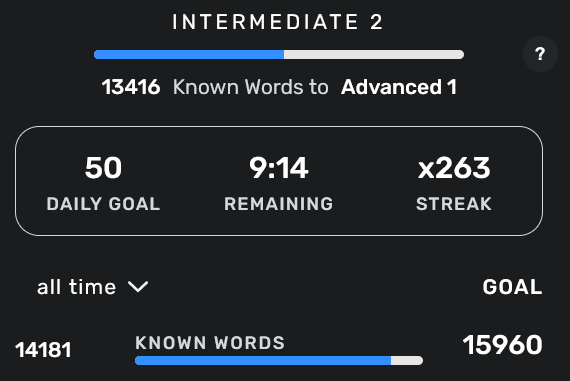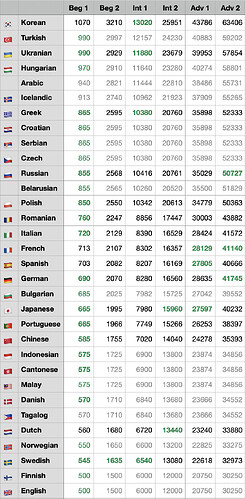French Advanced 1 is right!
German is saying 41,745 for the last known words goal on my end.
I feel like LingQ should either rename what they call each level or add more levels. Because I have reached Advanced 2 in German but I honestly wouldn’t describe my level as advanced, I feel more like I’m somewhere in intermediate.
For Japanese, the 15960 for Int 2 and 27597 for Adv 1 are definitely correct. I was Int 2 then got demoted/grandfathered when the change happened, so I see both targets for my goals now. Here’s a screenshot if you want to use it to mark Int 2 green.

Sounds about right for Korean as well. I have known for quite some time that I chose the most difficult language. ![]()
This is fantastic! Thank you!
For Russian, Advanced 2 is 50727, so your “very rough” estimate turned out to be pretty spot on!
For Greek, Intermediate 1 is 10380.
For Ukrainian, Int 1 is 11880.
Here is an updated version for the Known Word Thresholds - user-estimate - also called ‘guesswork’ for most languages in LingQ:
Thanks to those who have provided additional data points - this should have improved the estimates for some languages noticeably.
Green figures: Should be accurate (taken directly out of LingQ or from Forum Info)
Black figures: Extrapolated - based on limited data
Grey figures: Extrapolated - based on limited data, with lower degree of certainty
It’s really interesting to see how some of the languages changed (or didn’t). For instance, Greek used to be at 30,250 for Advanced 2, the same as English. Now it seems to be closer to the highly inflected languages like Russian. I’m also surprised how much higher Advanced 2 is in Ukrainian than Russian. Granted, it’s currently an extrapolation, but even the Beginner 1 number is considerably higher.
Italian Beginner 2: 2160
Spanish Int 1: 8040
English Beg 2: 1500
English Int 1: 6,000
Thanks. These seem to be pretty close to the estimates in the table (or similar for English).
Indeed. It would be interesting to get some comments on the reasoning behind the new figures for Greek, Russian and Ukranian from the LingQ Team at some point (provided the differences remain in principal with the final figures).
Previously there were only 3 broad categories that were relatively closely together.
Whereas, for the new figures ‘nsprung’ has stated that
“the LingQ team has been looking at the number of unique words used in some of our basic LingQ-produced courses.”
These unique words counts do show a considerable range for different languages (-> explains why there are some drastic changes). To what extent the LingQ Team has used additional expert judgement, I do not know. One advantage of the Mini-Stories is, that they provide a unique words count for almost all languages. However, there might be some differences in the way they had been translated (some a bit simpler to make it easier for beginnner, others perhaps in a somewhat more demanding way).
Another issue is, that these courses are all beginner material. Therefore, they may not be as representative for the word counts of higher levels.
This is not meant as a critique on the method or the LingQ team, but merely a comment on the inherent difficulties on such an endeavour.
The difference between russian and Ukrainian is probably because Ukrainian has more case endings for nouns. In Russian you only have one ending per gender/case combination, where in Ukrainian you have different declination groups as well.
Compare this:
to this:
I’ve had a similar experience with Danish
51425 is Advanced 2 for Polish
Nice. 11800 is Int 1 for Turkish; that’s my next level.
I can confirm Dutch beg 1 = 560 as you have in the table.
I did not know Ukrainian has seven cases! That’ll do it.
Thanks!
Italian Advanced 2 is 43,560
Italian is:
Beginner 1 - 720
Beginner 2 - 2,160
Intermediate 1 - 8,640
Intermediate 2 - 17,280
Advanced 1 - 29,880
Advanced 2 - 43,560
I found them out by going to one of the Italian challenges and opening the profiles of several people and checking their ‘all time’ stats.
Probably harder to find on the smaller languages, but you can still fill in a few more entries this way.
Thanks for your community effort. ![]()

Thanks - these Italian figures do match my latest (yet unpublished) estimates exactly. So I won’t need to collect all figures to be reasonable close/certain what the numbers should be.
However, there seem to be some outliers, so checking individual figures ist still useful. I will post an update (probably) tomorrow.

